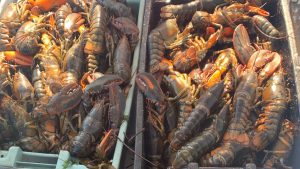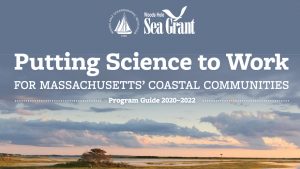Search results for: Canadian%20Online%20Pharmacy%20%E2%AD%90%20www.HealthMeds.online%20%E2%AD%90%20Cialis%2020%20Mg%20Prix%20Canada%20-%20Cialis%20Generic%20Canada
Unraveling the Mystery of Lobster Die-offs in Cape Cod Bay
In the summers of 2019 and 2020, lobstermen working in Cape Cod Bay hauled up their lobster traps to find most of them dead. What caused these unprecedented deaths? With funding from Sea Grant, WHOI Associate Scientist Malcolm Scully and his team developed a model using numerous datasets to unravel this mystery. The culprit, they…
Read MoreProperty Owners
Property Owners Technical Assistance Extension agents provides technical assistance to property owners on the following topics and issues: » Erosion control alternatives » Potential effects of various human activities on coastal landforms » Beach and dune restoration and stabilization techniques » Coastal landscaping » Coastal floodplains » Sea level rise » Storm surge » Flood…
Read MoreStrategic Plan
Strategic Plan Here in Massachusetts we are indelibly connected to the sea, with 75 percent of our citizens living within coastally situated counties. As such, our wellbeing and economy are increasingly reliant upon a healthy ocean and a resilient coastline, with each being challenged more and more by our changing climate. Putting Science to Work…
Read MoreTeacher Workshop: July 15, 2022- Sea Level Rise
The Perfect Storm: Exploring how sea level rise and storms intersect Presenters: Greg Berman, Coastal Processes Specialist, Woods Hole Sea Grant and Cape Cod Cooperative Extension – The Science of Sea Level Rise and Storms, Presentation Slides Shannon Hulst, Floodplain Specialist, Woods Hole Sea Grant and Cape Cod Cooperative Extension – Applying the Science:…
Read More2020-2022 Program Guide Available
The Woods Hole Sea Grant Program supports research, education, and extension projects that encourage environmental stewardship, long-term economic development, and responsible use of the nation’s coastal and ocean resources. It is part of the National Sea Grant College Program of the National Oceanic and Atmospheric Administration (NOAA), a network of 33 individual programs located in…
Read MoreTeacher Workshop: December, 3 2021-Invasive Species
Marine Invaders: Green crabs and other local invasive species Presenters: Dr. Carolyn Tepolt, WHOI Biology Department – Invasive Species on Our Shores, Presentation Slides Dan Martino, co-owner, Cottage City Oysters – Invasive Species in Aquaculture, Presentation Slides Date: December 2021 Lesson Plans and Classroom Activities NOAA Live! 4 Kids recorded webinars: These…
Read MoreSustainable Fisheries and Aquaculture
Sustainable Fisheries and Aquaculture 2022-2023 Projects » Andy Danylchuk and Lucas Griffin, University of Massachusetts Amherst: Stripers on the Line: Quantifying short-term post-release activity, behavior and mortality of striped bass (Moronesaxatilis) in the Massachusetts recreational fishery » Dr. Torrance Hanley of Northeastern University and collaborators: Determining How Aquaculture Grow-Out Methods Can Reduce the Negative Effects…
Read MoreHealthy Coastal Ecosystems
Healthy Coastal Ecosystems 2022-2023 Projects Robert Chen, University of Massachusetts Boston; Lois Hetland, Massachusetts College of Design: Cedric Woods, Institute for New England Native American Studies: Traditional Ecological Art & Science: Designing sustainable shorelines Malcom Scully, Woods Hole Oceanographic Institution, and Rocky Geyer, Woods Hole Oceanographic Institution: Modeling Unprecedented Low Dissolved Oxygen (Hypoxia) in Southern…
Read MoreHuman Dimension of Rebounding Population of Seals and White Sharks on Cape Cod, Massachusetts
Human Dimension of Rebounding Populations of Seals and White Sharks on Cape Cod, Massachusetts Principal Investigator Jennifer Jackman, Salem State University Co-Principal Investigators Owen Nichols, Center for Coastal Studies Lisa Sette, Center for Coastal Studies Stephanie Wood, Univ. of Massachusetts-Boston Melissa Sanderson, Cape Cod Commercial Fisherman’s Alliance Stephanie Sykes, Cape Cod Commercial Fisherman’s Alliance Cynthia…
Read MoreCarbon’s Journey and Our Warming Planet
Frank Niepold and Tom Di Liberto, NOAA’s Climate Program Office in Silver Spring, MD The carbon cycle is a process where carbon dioxide travels from the atmosphere into living organisms and the Earth, then back into the atmosphere. Learn how changes in carbon dioxide levels, such as burning fossil fuels (oil, gas, etc.), affect the…
Read More

